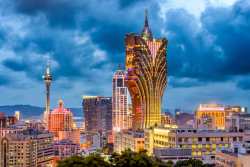
Macau, China city skyline at dusk.
The plan is changing in Macau (or Macao, or however you want to spell it). In what looks like a maturing of the market in the Asian gambling town, the former Portuguese territory is targeting the burgeoning Chinese middle classes.
Following in Las Vegas’ footsteps, which these days sees itself more of an entertainment town rather than a gambling town, middle-class Chinese thrill seekers are starting to follow in the footsteps of the high-roller VIP gamblers (who generally play baccarat) in ever greater numbers.
This “premium mass sector” could be the start of a second boom in Macau, where the Cotai Strip (formerly a mosquito infested swamp) has already been changed beyond recognition big-hitting high roller casino players from the mainland.
“This could well be the golden age of Macau,” commented Lawrence Ho, CEO of Macau casino operator Melco Crown Entertainment Ltd.
The company, co-owned by Lawrence and billionaire James Packer from Down Under, said on Wednesday that net income doubled in Q2 thanks to strong growth in visits from China’s swelling middle class. Melco has two casino resorts in Macau is cutting the ribbon on a new $3 billion property in mid-2015.
Melco and other big hittters such as Sands and Wynn have in the past made most of their money from wealthy customers who blow more than 1 million yuan ($160,000) each bet. But as the big whale gamblers market saturates, and China’s economy slows down, casinos are increasingly looking to the upper-middle-class market to drive more yuan through the tables.
Revenue from the mass segment is forecast to surge by 30 percent this year compared with around 10 percent for VIPs.
Premium mass players generate higher margins and more consistent revenue for the casinos than super-rich gamblers, who bring with them all sorts of complications like junkets.
And the communications links just get better as China builds its high-speed train network and builds out projects such as the 38 billion yuan bridge connecting Hong Kong, Macau and Zhuhai, slicing the travel time from northern China. The bridge should be operational by 2016.
Plus the development of Hengqin, an island 200 meters away from the Cotai strip, is expected to further boost numbers.
No gaming will be permitted on the island, but entertainment complexes including a whale and shark aquarium will be built to cater for families and mid market visitors.
The Chinese government wants Macau to attract “softer”, leisure tourists. Macau goes from strength to strength!